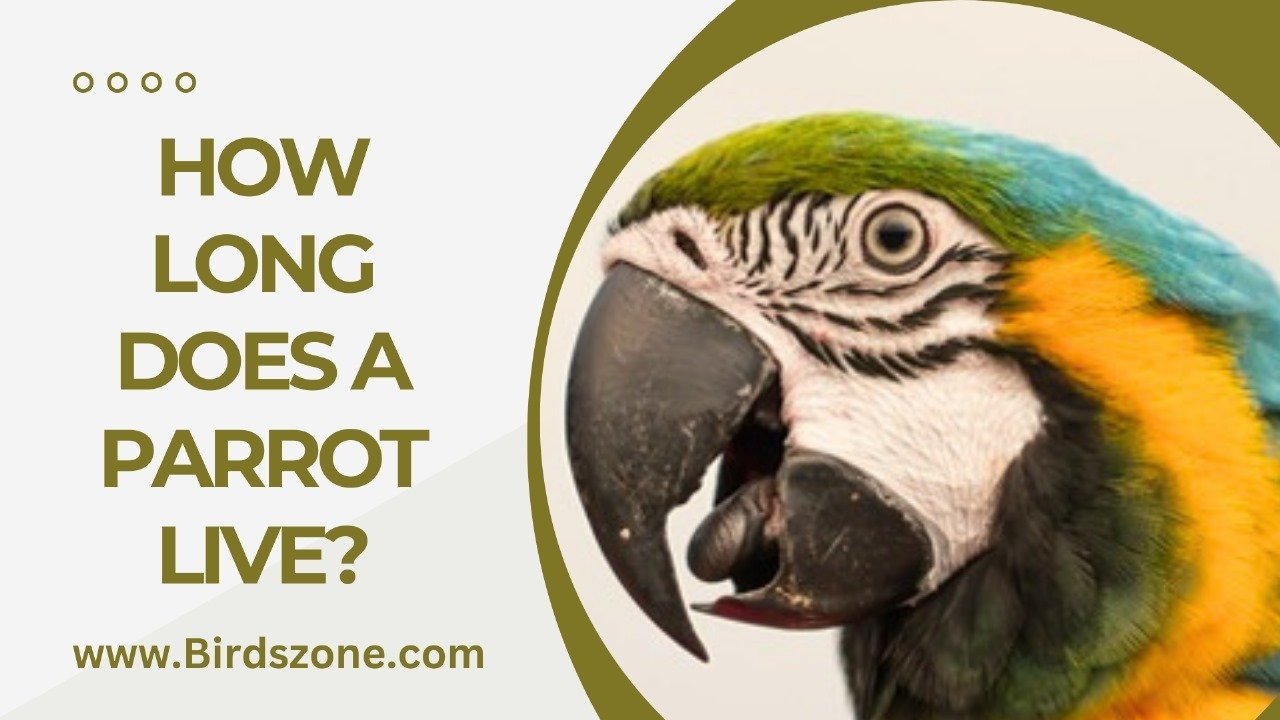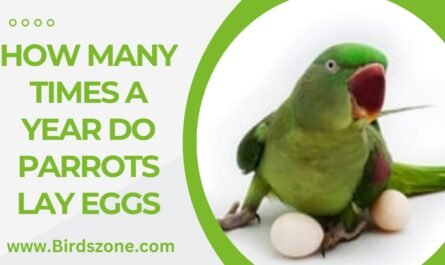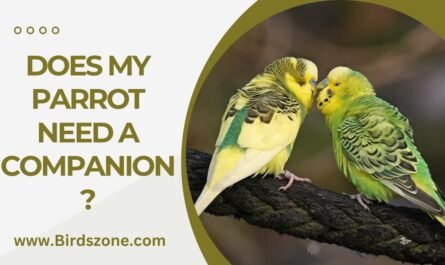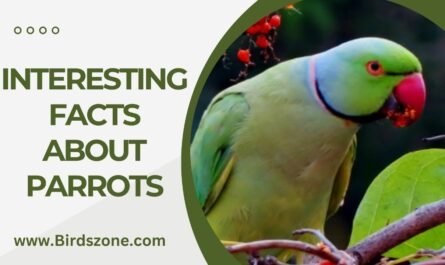If you are thinking of adding the feathered friend in your residence One of the most frequently asked questions prospective bird owners are asking is “How long does a parrot live?” Knowing the life span of a bird is essential because it will significantly affect the dedication and attention required.
Parrots aren’t just lively and active pets. They can also be long-term partners and some species live for as long as human beings. We examine the different elements that impact the life span of parrots. These range from specific traits of species to the effects of the environment and care.
If you’re an experienced bird lover or novice, understanding the lifespan of these magnificent birds is crucial to establishing an enduring and loving connection with their species.
Common Parrot & Pet Birds Average Lifespans

Parrots are known for their bright colors as well as their ability to mimic human speech, are adore pets across the globe. The life span of parrots is different for each species and dependent on factors like environmental factors, genetics as well as the quality of the care.
Budgerigars (Budgies)
These birds are often referred to “budgies,” these small bird species are popular for pet owners. In nature the average lifespan of these birds is between 5-8 years old, however provided they are treate with care and respect when kept in captivity, they could last up to 10 years.
Cockatiels
The Australian natives are renowned by their distinctive crest and are one of the most sought-after pets of birds. In nature they can live for 10-14 years. However, in captive, they live to 16-25 years when given the proper maintenance.
African Grey Parrots
Famous by their intelligence and ability to speak, African Grey Parrots are huge birds and can lead for a very long time. They generally live for 40 to 60 years in captivity. However, they have also been observe to live up to 70 years.
Amazon Parrots
Parrots of medium size are renown for their playful disposition and their ability to talk. In captivity they usually remain for between 25 and 50 years but some species can last the age of 60.
Macaws
Macaws are big, vivid parrots known for their size and striking colouration. They are among the longest lives among parrots. Many species are that live for 50 to 60 years when kept in captivity. others living to over 70 years.
Lovebirds
Although small in stature, they are big in character, Lovebirds usually live for about 10 years when they are in the natural. When kept in captivity, if they receive proper maintenance, they may be around 20 years old.
Eclectus Parrots
They are known for their stunning gender dimorphism with the male being green, while females are blue and red. Eclectus Parrots are able to live for approximately 30-50 years in captive.
Conures
They are large-sized parrots that live predominantly throughout South America. Their lifespan is dependent on species, but usually ranges from 15 to 30 years within an environment that is domestic.
What Makes Some Parrots Live Longer Than Others?

The life span of parrots differs significantly among species. But, a variety of factors determine why certain parrots last longer than others. This makes it a fascinating part of their behavior and health. Knowing these aspects is essential to anyone who is interested in keeping the parrot as a pet.
The species of parrot played an important role. Greater species, including Macaws as well as African Grey Parrots, generally last longer than smaller ones such as Budgerigars (Budgies) as well as Lovebirds. This is mostly caused by genetics.
Diet is vital to long-term health of the parrot. A diet that’s rich in vegetables, fruits as well as nuts and made pellets will lead to better overall health as well as a longer lifespan. Insufficient nutrition can cause overweight, malnutrition as well as health problems, reducing the lifespan of a person.
They must have a neat large, open space to stimulate the physical and mental activities. Unclean or crowded environments could cause health issues and stress. Ample space for exercise as well as things to stimulate the mind are essential for their general wellbeing.
They’re extremely social. Boredom and loneliness may cause stress that can affect their wellbeing. A regular interaction with their caregivers, whether human or bird-related, are able to boost their overall health as well as their longevity.
Regular check-ups with a veterinarian that include vaccines as well as parasite elimination, are essential for the long-term health of a parrot. The early detection and treatment of medical issues could prevent issues that may reduce their lives.
A regular exercise routine is vital to maintain the proper weight, and also preventing illnesses. Being in a secure area or in a spacious cage keeps them in shape and increases their longevity.
The birds that are bred in captivity could differ in lifespans from wild birds. Responsible breeding methods may result in better-being birds and longer life spans.
They are prone to toxic substances in the environment including smoke, certain gases as well as household chemicals. Avoiding exposure to these toxic substances is crucial for their long-term wellbeing.
Factors That Can Affect Parrot Life Expectancy
In determining “how long does a parrot live,” it’s crucial to take into consideration a variety of factors which can have a significant impact on the lifespan of a parrot. They can reduce or increase the lifespan of a parrot, based on the way they’re controlled.
An attractive menu is crucial to attract and satisfy patrons, since it defines the dining experience, and also shows off the food and beverage offerings of the establishment. From entrees and appetizers to drinks and desserts the menus are designed so that they can accommodate a variety of desires and preferences in food.
They are available in a variety of types, including printed versions, digital displays, or online platforms to satisfy the requirements of contemporary customers. Through providing an extensive and attractive menu restaurant menus are able to efficaciously present their company’s brand image and encourage customers to dine at their establishments.
Diet and Nutrition
An energizing and balanced diet is vital to the longevity of a pet. Offering them a wide variety of vegetables, fruits such as seeds, nuts and specially designed pellets assures that they are getting all the nutrients they require. Poor diets can result in malnutrition or obesity and both can significantly reduce the time that a bird lives.
Quality of Care
Regular vet check-ups, good grooming as well as maintaining a clean and tidy and healthy living space are vital factors that help prolong the lifespan of a parrot. Inattention in any of these areas could result in health issues decreasing their life span.
Mental and Emotional Well-being
Parrots are extremely intelligent and social creatures. They are able to stimulate their brains by interaction, toys and even training are essential. Inactivity in the mind can cause depression and stress. This can adversely impacting the length of time a parrot lives.
Exercise
Regular physical exercise is essential for parrots to stay well. A lack of exercise could result in overweight as well as health concerns and can impact their longevity.
Genetics
The genetic history of parrots plays part in determining the life span. Certain species live naturally longer than other species. In addition, genetic issues can alter the time that a parrot spends.
Social Interaction
Interaction with people or other birds may rise the quality of a bird’s living. The isolation can result in emotional stress that can negatively affect the length of time a parrot stays.
Breeding Practices
The background of breeding bird species can affect their lifespan. Breeding in captivity with no taking into account genetic diversity could suffer from a lower lifespan due to health issues that can be inherited.
Stress Management
Controlling stress is essential for the wellbeing of parrots. Stress can cause a decline in the immune system and make them more vulnerable to illnesses that can significantly cut down the length of time that a parrot will live.
Access to Sunlight and Fresh Air
A good exposure to sunlight and fresh air is crucial to the overall health of parrots. This aids in the synthesis of vitamin D and keeps a healthy respiratory system that contributes positively to the length of their lives.
5 top Ways to Improve a Parrot’s Lifespan

The perfect way to extend the lifespan of a parrot is through an appropriate mix of care as well as nutrition and the environment. Below are five proven methods to assure that your bird’s feathers live an extended and long-lived life:
Provide a Nutritious Diet
The right diet is vital for the well-being of parrots. It includes fruit, veggies, nuts and premium pellets. Fresh fruits, vegetables, and pellets serve important nutrients. They also benefit to prevent weight procure and nutritional deficiency. Beware of feeding your birds avocados and chocolate as they are poisonous to birds.
Ensure Regular Exercise
Parrots require exercise in order in order to remain healthy. The ability to let them fly around in an enclosed, safe area or by offering climbing platforms inside the cage keeps them healthy. Exercise helps prevent obesity, builds their muscles and enhances their mental wellbeing.
Create a Stimulating Environment
The stimulation of the mind is just as vital as physical fitness. Parrots can be intelligent, and be bored quickly. Give them toys to benefit with problem solving as well as foraging for food and mimic the natural behavior. Regularly changing the toys can help to keep the play area interesting and stimulating.
Maintain Social Interaction
Parrots are social beings that thrive in interaction. You can spend time with your pet parrot and teaching them tricks or even sitting in the same space with them. A lack of interaction with others may cause stress or behavior problems.
Regular Health Check-Ups
Similar to humans, parrots also benefit by regular check-ups for their health. A vet who specializes in bird health will be able to identify and treat issues earlier, which is essential for a longer life span. Be aware of any changes to your pet’s behavior or appearance as those could indicate early indications of health concerns.
Final Words
The query “How long does a parrot live?” is the intricate interaction of many variables, which include the species of parrots, genetics, diet environmental conditions, as well as the quality of the care. Parrots don’t simply serve as pets as they’re long-term partners which require an enormous dedication in the form of the time, love and the responsibility. Their lives span a wide range of species, and some live more than 70 years. The longevity of these animals requires dedicated attention and an comprehension of the needs.



